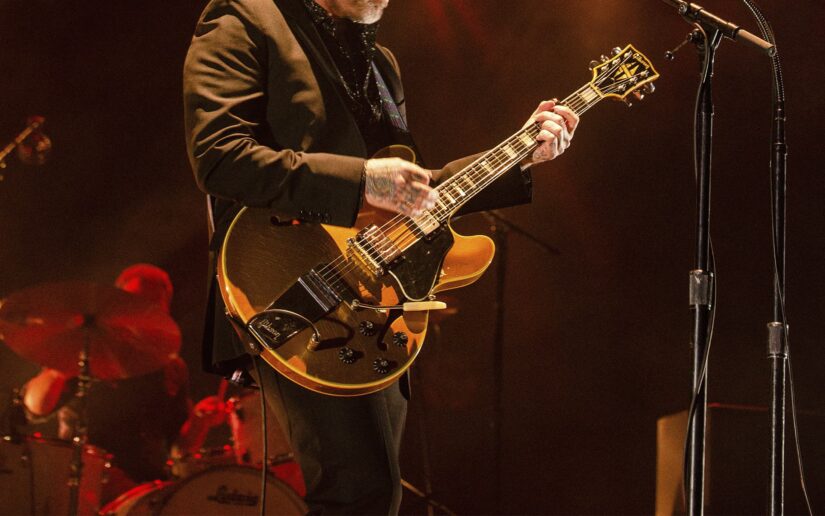John McLaughlin
John McLaughlin is one of the few European guitarists who have achieved worldwide recognition (including in America, which is very reluctant to admit musicians from the outside). Virtuoso performer, experimenter, one of the founders of the “jazz-rock” style.
John McLaughlin was born on January 4, 1942 in a small English town of Yorkshire. His mother was a violinist, so it is natural to assume that John from childhood began to be accustomed to music. When he was nine years old, he was taught piano, but after two years John switched to guitar. He was inspired by the blues that was popular at the time, sounding literally from everywhere. By the age of 14 he had quite mastered the basic wisdom of playing the guitar and switched to flamenco music, rightly reasoning that this style was one of the most technically challenging and needed to be learned to become more fluent on the instrument. He later developed a keen interest in jazz music as one of the highest forms of musical art.
John soon moves from Yorkshire to London. There he worked for a while, playing alongside Alexis Korner, George Fame and Graham Bond.
McLaughlin records with various musicians, performs a lot, and works in Germany (German guitarist Gunther Hapel invited him to collaborate). In 1969 John records his first solo album “Extrapolation”, which became a notable event in British music. Soon he was unexpectedly invited by American drummer Tony Williams (who had played with Miles Davis), who formed his own band “Lifetime”. In the same year McLaughlin comes to New York, where he records on Miles Davis’ albums “In A Silent Way” and “Bitches Brew”. It was the latter album that became a milestone in the history of jazz music: so organically and naturally intertwined in it were the beat dimensions of rock music and complex jazz harmonies and improvisations. Perhaps it was from this album that the word “jazz-rock” entered the vocabulary of musicians. Many jazzmen perked up, in jazz-rock they saw a way out of the deadlock, which practically stopped the development of jazz at that time. McLaughlin’s participation in these albums brings him fame among all fans of jazz and rock music.
Around the same time, McLaughlin begins to take a very serious interest in Indian philosophy, yoga, and, naturally, music, markedly different from the common European classical notions of harmony. This serious passion resulted in one of McLaughlin’s most ambitious projects, which had a huge impact on all modern music – the Mahavishnu Orchestra was created. The powerful composition (John McLaughlin – guitar, Ian Hammer – keyboards, Rick Laird – bass, Billy Cobham – drums, Jerry Goodman – violin), virtuoso performance, sophisticated music and exquisite arrangements made a real revolution in the world of jazz and rock. With the release of the album “The Inner Mounting Flame” (1971) to McLaughlin comes true fame. However, after a while he decides to change his lineup. Many critics agree that the second lineup was not as popular as the first, despite the fact that there were some very strong musicians (in particular, the famous violinist Jean-Luc Ponty).
In the mid-70s, McLaughlin surprised the world again by forming another of the groups performing acoustic Indian music, “Shakti”. This group featured such luminaries as Indian violinist Shankar and percussionist Zakir Hussain. With Shakti, McLaughlin recorded three excellent albums. Gradually, McLaughlin’s fascination with Indian music wanes. He begins to feel the need to play European music. Still, McLaughlin returned to Indian music more than once, and the fascination does not go in vain.
In 1978, McLaughlin takes part in a trio of guitarists playing Spanish flamenco music (his old hobby came in handy). The trio consisted of John McLaughlin himself, Spanish flamenco virtuoso Paco de Lucia and Larry Corriel, who was later replaced by the not-so-famous Al di Meola. The most famous album recorded by this lineup is called “Friday Night In San Francisco”, which went “gold”. Despite McLaughlin’s stunning playing, some critics noticed an excessive dry “precision” of his improvisations, noting that flamenco is a national music, and to play it perfectly, one must have Spanish roots and temperament.
After releasing two solo albums (“Belo Horizonte” and “Music Spoken Here”) in 1984, John McLaughlin was again invited by Miles Davis to record “You’re Under Arrest” and “Aura”. In addition to McLaughlin, another guitar master, jazz musician John Scofield, played on You’re Under Arrest. In the same year, McLaughlin records an album called Mahavishnu, where he uses a guitar midi controller paired with a Sinclavier system.
